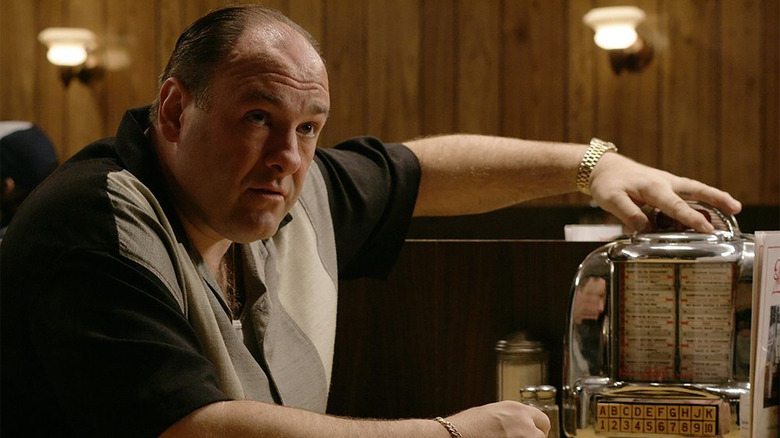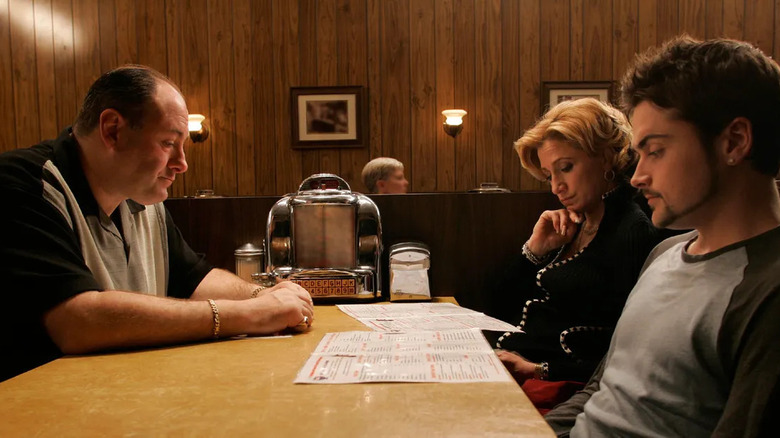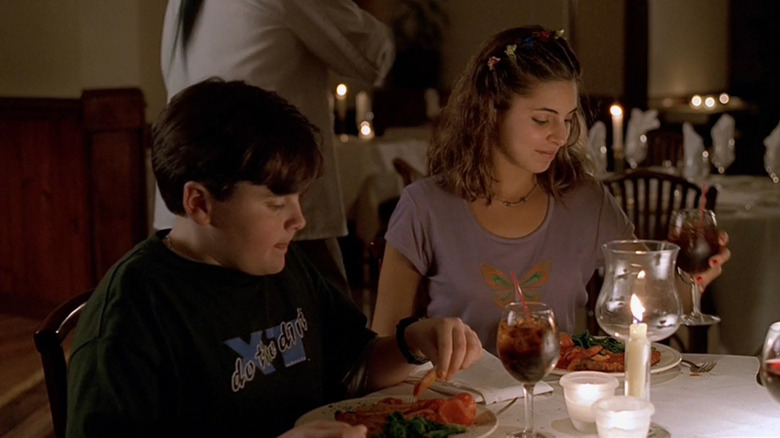The Sopranos' Creator Never Thought The Ending Would Be So Controversial
As far as controversial endings go, "The Sopranos" is definitely up there. Although the anger mellowed out a little with time, it's still considered a major disappointment by the section of the "Sopranos" fanbase who were hoping for a little more closure. What's going on with those sketchy-looking guys in the restaurant? Is Tony (James Gandolfini) going to die? If not, what's gonna happen with that RICO case closing in on him?
The finale doesn't tell us; it just cuts to black mid-sentence, leaving us to imagine for ourselves what happened. As every single person who watched it live in 2007 will tell you (repeatedly), they first thought their cable had gone out. By the time they realized the sudden silence and black screen was deliberate, it was hard not to feel a little screwed over. People were expecting a big, climactic conclusion, and this was not that.
For the past 15 years, discussions around "The Sopranos" have been disproportionately centered around the question of whether of not Tony died at the end. Poor showrunner David Chase can't seem to get through a single interview without being asked about it. "I thought the ending would be somewhat jarring, sure," Chase said in 2015, "But not to the extent it was, and not a subject of such discussion."
Chase confirms it
Last year, Chase seemingly put the question to rest by confirming that he'd always intended to kill Tony off. He just didn't always intend to kill him off at a restaurant. Chase told The Hollywood Reporter:
"I had a scene in which Tony comes back from a meeting in New York in his car. At the beginning of every show, he came from New York into New Jersey, and the last scene could be him coming from New Jersey back into New York for a meeting at which he was going to be killed."
Chase ended up changing the death scene so it happened at a restaurant with Tony's family, and he made Tony's death a callback to Bobby Bacala's line about getting whacked from earlier in the season: "You probably don't even hear it when it happens, right?"
The shot to black was intended to show Tony's death from his perspective, but it's often interpreted as something far more ambiguous. As one film critic put it, "Tony might have died in the moment it cut to black or he may just have had a boring dinner, but as long as he's stuck in that life he'll always be living on a knife's edge."
This interpretation is now a little undercut by Chase outright confirming Tony's death, but it still has some truth to it. In the end, it really shouldn't matter if Tony dies or not in that final scene. Trying to search through the rest of the series for "clues" to solve the big "mystery" of whether Tony died is besides the point. If knowing the exact details of Tony's death was important for the story, they never would've cut to black in the first place.
A more straightforward ending than you'd think
David Chase wasn't trying to troll the audience with the final scene. He never expected things to escalate to the point where 90% of the discussion around the show centers around the last few minutes. As he put it back in 2015:
"The biggest feeling I was going for, honestly, was don't stop believing ... Life ends and death comes, but don't stop believing. There are attachments we make in life, even though it's all going to come to an end, that are worth so much, and we're so lucky to have been able to experience them ... Either it ends here for Tony or some other time. But in spite of that, it's really worth it."
As much as the final scene evokes a sense of dread for the future, it's also a celebration of Tony's life so far. Despite their many, many flaws, the Sopranos do love each other, and they're still getting together for dinner eight years after we first met them. The final scene is a reminder that how Tony's life ends up is not the defining thing we should judge him by. Everything that happened before is just as important.
That's what makes the disproportionate obsession over the final scene a little depressing. The show itself is telling us to not put so much stock in how things end, and yet we've gone ahead and let the ending overshadow everything that happened on screen. "The Sopranos" is six seasons long, or 86 full episodes, and it's given us plenty of other interesting things to talk about. Maybe it's time to put to rest the question of what happens after the cut to black, and instead we should focus on what happens on the show itself.


